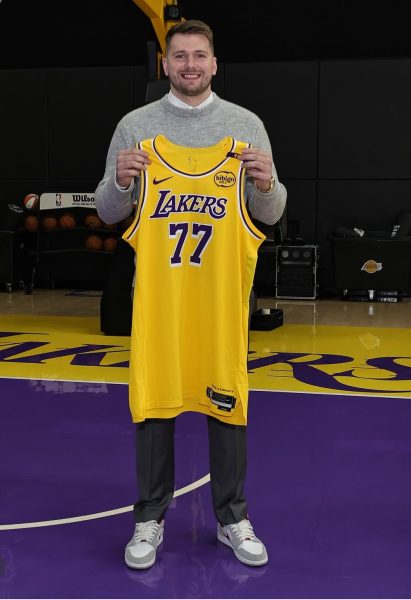The 2025 NBA trade deadline was nothing short of ridiculous, with many fans considering it more exciting than most regular season games as teams traded stars away left and right, reshaping the league for years to come.
The most shocking trade of the two-week frenzy came Feb. 1, when the Dallas Mavericks traded their 25-year-old franchise star, guard Luka Dončić, along with forward Maxi Kleber and forward Markieff Morris, to the Los Angeles Lakers for NBA champion and four-time all-NBA first team center Anthony Davis and guard Max Christie. The trade broke the internet, shook the NBA community and redefined expectations of job security in the league.
Why would anyone trade away a young star who is currently averaging 27 points, 8 rebounds and 8 assists per game? Statistics aside, Dončić led the Mavericks to the 2024 NBA Finals as the 5th seed and was undeniably the primary reason for that success.
He was unstoppable last season, picking up the slack when his guard, Kyrie Irving, struggled in the playoffs. Dončić won rookie of the year for 2018-2019 season, finished 3rd in MVP voting for 2023-2024 season, has 5 first-team all-NBA selections and was the center of Dallas’ offense.
Even though the Mavericks were 26-23 before the trade and struggling in the West, they still had the potential to make a playoff run. Their roster had too much talent to ignore. With the addition of guard Klay Thompson, who shoots 39% from three and averages 13.9 points per game, and the depth provided by Spencer Dinwiddie, Derrick Lively, Quentin Grimes and PJ Washington, the team was poised to come alive in the playoffs.
The best recipe for success as a general manager is to have a contending team with experience alongside young stars. Just look at the Boston Celtics, who, after years of falling short in the Eastern Conference Finals, won a championship with 26-year-old Jayson Tatum and 27-year-old Jaylen Brown. Tatum himself averaged an impressive 25 points, 9.7 rebounds and 6.3 assists in the 2024 playoffs through 19 games.

Now, the Mavericks have replaced their young star with an aging one in Davis, who is 31 and injury-prone. In Davis’s first game with the Mavericks on Feb. 8, he suffered an adductor strain that may sideline him for weeks. The start is already looking like a recipe for disaster in the long term for the Mavericks.
Davis has never thrived as the number one option, as shown during his time with the New Orleans Pelicans, where he never made it past the first round of playoffs. While the Mavericks may still have a shot at contending, their championship window has drastically shortened, and now they have a significant hole to fill offensively. They’ve made it clear: they’re in win-now mode.
On paper, the trade still doesn’t make sense, though there seems to be an underlying context that made it more justifiable. Dallas general manager Nico Harrison has expressed concerns about Dončić’s weight, as an ESPN report claimed that he weighed as much as 260 pounds at one point. Concerns about Dončić’s conditioning and habits persisted, and Harrison seems to believe the star’s body will break down soon.
Additionally, it was surprising to learn that Harrison had only discussed trade talks with Lakers general manager Rob Pelinka and with no other team. He didn’t even inform Mavericks Head Coach Jason Kidd, who said he found out in “the 11th hour.”
From the Lakers’ perspective, you can’t pass up the opportunity to acquire someone as proven and skilled as Dončić, even at the cost of trading away your defensive player of the year front-runner, Davis.
Pelinka recognized the defensive void left by Davis that he needed to address and traded Cam Reddish, Dalton Knecht and a 2031 unprotected first-round pick for Charlotte Hornets center Mark Williams, who is defensively dominant and averaging 15 points and 9 rebounds per game this season.
Yet, the Lakers rescinded the Williams trade after the center failed to pass a physical exam. The Lakers have since signed free-agent center Alex Len to fill that hole.
The Lakers will never concede to a position of rebuilding or tanking as long as LeBron James is on the team — it’s simply disrespectful and ill-advised. As long as James is playing, you do everything you can to build a championship contender. Pelinka’s move seems to keep that mindset while setting the Lakers up for the future once James retires.
If it fails, you still have Dončić and young talent in guard Austin Reaves. In the short term, if the Lakers win a ring in the next two to three years, the Mavericks will go down as a generational laughing stock.
This trade also raises the question: is anyone really untradeable? If someone like Dončić or Davis can get traded, could players like the Oklahoma City Thunder’s Shai Gilgeous-Alexander, the Milwaukee Bucks’ Giannis Antetokounmpo or Tatum leave the franchise to which they’ve remained loyal overnight? Luka was more than a good player for the Mavericks; he was the homegrown star who made the team relevant again, a symbol of hope for the city and a lovable icon. Yet all that still wasn’t enough for Harrison to want to keep him, even at the cost of losing his team’s best player during an already up-and-down season and shortening their championship window. It would be heartbreaking to see a personal vendetta with Luka Dončić send the Mavericks into another decade of irrelevance.
These two teams have made it clear: they are both committed to winning now, and they’re boasting about it. Let’s see what happens.